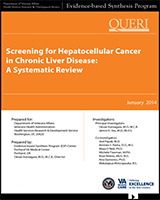NCBI Bookshelf. A service of the National Library of Medicine, National Institutes of Health.
Kansagara D, Papak J, Pasha AS, et al. Screening for Hepatocellular Cancer in Chronic Liver Disease: A Systematic Review [Internet]. Washington (DC): Department of Veterans Affairs (US); 2014 Jan.

Screening for Hepatocellular Cancer in Chronic Liver Disease: A Systematic Review [Internet].
Show detailsHepatocellular carcinoma (HCC) is the fifth leading cause of cancer related death among men and ninth leading cause of cancer related death among women in the United States.1,2 Chronic hepatitis B, common in Asia, is associated with HCC even in the absence of cirrhosis because of direct oncogenic properties of the virus. In Western countries, on the other hand, cirrhosis, most commonly from chronic hepatitis C infection and alcoholic liver disease, is the predominant risk factor for the development of HCC.3 In the Veterans Health Administration (VHA), there has been a marked increase in the prevalence of cirrhosis from chronic hepatitis C infection with a corresponding increase in the number of HCC diagnoses. From 1996 to 2006, the prevalence of cirrhosis among Veterans with chronic hepatitis C infection rose from 9-18.5%, and the prevalence of HCC rose from 0.07-1.3%.4 In the general population, the incidence of HCC rose between 1992 and 2005 from 3.1/100,000 to 5.1/100,000, with localized tumors accounting for most of the increase.5 While on average the 5-year survival of HCC is low (13-16.5%),5,6 the survival of early-stage disease has risen.5
The rationale for screening is that imaging tests such as ultrasound can identify patients with early stage HCC7 and there are several potentially curative treatment options for patients with early stage HCC including liver transplantation, radiofrequency ablation, and liver resection.8 Several professional society guidelines currently recommend HCC screening using imaging studies and tumor markers, mainly in patients with chronic hepatitis B or liver cirrhosis.8-10 However, recommendations for HCC screening remain controversial in part because of concerns over the quality and paucity of existing evidence, and because there have been concerns raised about overdiagnosis and patient harms in other cancer screening programs.11-15
We conducted a systematic review of the published literature to better understand the incremental benefits and harms of routine HCC screening in patients with chronic liver disease compared to clinical or incidental diagnosis. We looked for direct evidence of the health outcome effects of screening. We also looked for indirect evidence of the effects of screening by evaluating studies examining the health outcome benefits and harms of treating early-stage HCC which, because the intent and result of routine screening is detection of early-stage disease, is a proxy for screen-detected disease.
- BACKGROUND - Screening for Hepatocellular Cancer in Chronic Liver Disease: A Sys...BACKGROUND - Screening for Hepatocellular Cancer in Chronic Liver Disease: A Systematic Review
- Structural cells are key regulators of organ-specific immune responseStructural cells are key regulators of organ-specific immune responseStructural cells are key regulators of organ-specific immune responseBioProject
- PREDICTED: Megalobrama amblycephala calcium channel, voltage-dependent, gamma su...PREDICTED: Megalobrama amblycephala calcium channel, voltage-dependent, gamma subunit 8b (cacng8b), mRNAgi|2238784537|ref|XM_048152775.1|Nucleotide
- SRX2033537 (1)SRA
- protein ALP1-like [Cucurbita maxima]protein ALP1-like [Cucurbita maxima]gi|1281045448|ref|XP_023007481.1|Protein
Your browsing activity is empty.
Activity recording is turned off.
See more...